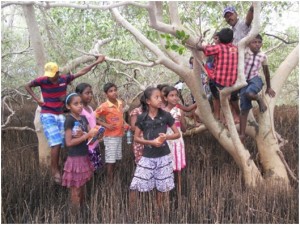Mangrove Rangers in Kokilai – Students gain an insight in to mangrove ecosystems
View(s):Today’s article continues to focus on real projects in action in learning more about the delicate nature of a variety of ecosystems, the importance of the webs and the ecological connections and working to protect nature through the understanding of these vital concepts. Following are the details of one such programme. 
The Mangrove Rangers programme focused to give children a positive connection to their natural heritage, empower them to make conservation actions and become advocates for environmental conservation in their schools and communities and strengthen their relationships for better future of human beings. Rainforest rescue international, a non-governmental organisation working towards a sustainable managed world, implemented the school ranger programme within the Kokilai schools with the support of USAID.
Both the schools are located on the North- east coast of Sri Lanka, in close proximity to the Kokilai lagoon. The programme was conducted with 50 students, 25 from each of the schools that represent two ethnic groups – Sinhala and Tamil, from grades 6-11, the programme identified students who are interested in studying environmental ecosystems.
The programme was built on the experiences of students and it took the opportunity to explore threats to the mangroves and coastal ecosystems and identify conservation actions.
The initial part of the programme focused on ecosystem developments and energy flow. The students were enabled to learn more about this by watching videos on different ecosystems.
The students are introduced to the beauty of the lagoon through a boat ride. They observed the lagoon and a few students submitted  poems and drawings about the beauty of the lagoon.
poems and drawings about the beauty of the lagoon.
The students were then introduced to the concept of food webs, the aim was to get children to understand that ecosystems are made up of many different components and if there is a problem in one area all the others will be affected. This is important especially in terms of understanding the affect of humans on the ecosystems and the food webs.
The students made a special field visit to the mangrove areas, and observed the adaptations of mangrove trees to their specialised environment. In appreciation of the vast biodiversity supported by these mangrove ecosystems, students were taught proper methods of bird-watching. The students were provided with binoculars as a part of the program.
Joanne Kotelawala, (British Council International Climate Champion, British Council Active Citizens Facilitator and Past President of Green Army of Spectrum Institute of Science and Technology)
Follow @timesonlinelk
comments powered by Disqus



















